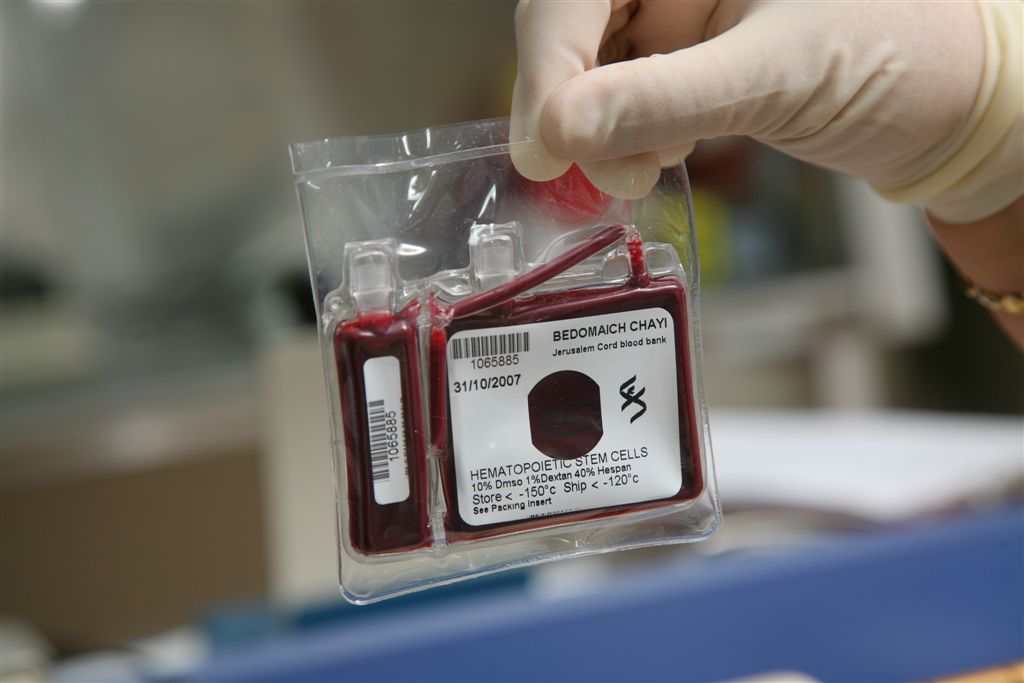Cord Blood Transplants May Outperform Matched Sibling Donors
|
By LabMedica International staff writers Posted on 16 Jun 2020 |

Image: A unit of cord blood that can be used for stem cell transplants (Photo courtesy of Catholic University of Valencia).
When a cancer patient needs a bone marrow transplant, there are four common donor sources: A matched related donor (sibling), a matched unrelated donor (from a donor database), a half-matched donor, or umbilical cord blood.
There are advantages and disadvantages to each approach, but consensus has generally ranked a matched sibling first, followed by a matched unrelated donor, with cord blood and half-matched donors reserved for patients without either of the first two options.
Hematologists at the University of Colorado Anschutz Medical Campus (Aurora, CO, USA) compared outcomes among adult matched related donor (MRD) patients undergoing peripheral blood stem cell transplantation and adult patients undergoing double unit cord blood transplantation (CBT), between 2010 and 2017. A total of 190 CBT patients were compared with 123 MRD patients. Median follow-up was 896 days (range, 169-3,350) among surviving CBT patients and 1,262 days (range, 249-3,327) among surviving MRD patients. For MRD donors, median infused cells were 6.07 × 106 CD34/kg (range, 2.99-9.66).
The scientists reported that in the comparison of 190 patients receiving cord-blood transplants with 123 patients receiving transplants from the "gold standard" of matched sibling donors showed no difference in survival outcomes between these two approaches, with significantly fewer complications due to chronic graft-versus-host disease in patients receiving transplants from cord blood. In addition to showing a decrease in the chance of graft-versus-host disease, which develops when a transplanted blood system attacks a patient's tissues, the study shows a slightly lower rate of relapse in these patients undergoing transplant with cord blood.
Jonathan A. Gutman, MD, CU Cancer Center investigator and director of the allogeneic stem cell transplantation program and senior author of the study, said, “It turns out that for adults, it's very hard to find a single cord blood unit that meets the parameters we know need to be met in terms of size. To overcome this barrier, we often use two units from different sources. We think there are important advantages of cord blood, especially with respect to graft-versus-host disease. Previously, we've taken a position recommending cord blood over matched unrelated donors, and now we show that cord blood may even out-compete the gold standard of matched sibling donors.” The study was published on May 22, 2020 in the journal Blood Advances.
Related Links:
University of Colorado Anschutz Medical Campus
There are advantages and disadvantages to each approach, but consensus has generally ranked a matched sibling first, followed by a matched unrelated donor, with cord blood and half-matched donors reserved for patients without either of the first two options.
Hematologists at the University of Colorado Anschutz Medical Campus (Aurora, CO, USA) compared outcomes among adult matched related donor (MRD) patients undergoing peripheral blood stem cell transplantation and adult patients undergoing double unit cord blood transplantation (CBT), between 2010 and 2017. A total of 190 CBT patients were compared with 123 MRD patients. Median follow-up was 896 days (range, 169-3,350) among surviving CBT patients and 1,262 days (range, 249-3,327) among surviving MRD patients. For MRD donors, median infused cells were 6.07 × 106 CD34/kg (range, 2.99-9.66).
The scientists reported that in the comparison of 190 patients receiving cord-blood transplants with 123 patients receiving transplants from the "gold standard" of matched sibling donors showed no difference in survival outcomes between these two approaches, with significantly fewer complications due to chronic graft-versus-host disease in patients receiving transplants from cord blood. In addition to showing a decrease in the chance of graft-versus-host disease, which develops when a transplanted blood system attacks a patient's tissues, the study shows a slightly lower rate of relapse in these patients undergoing transplant with cord blood.
Jonathan A. Gutman, MD, CU Cancer Center investigator and director of the allogeneic stem cell transplantation program and senior author of the study, said, “It turns out that for adults, it's very hard to find a single cord blood unit that meets the parameters we know need to be met in terms of size. To overcome this barrier, we often use two units from different sources. We think there are important advantages of cord blood, especially with respect to graft-versus-host disease. Previously, we've taken a position recommending cord blood over matched unrelated donors, and now we show that cord blood may even out-compete the gold standard of matched sibling donors.” The study was published on May 22, 2020 in the journal Blood Advances.
Related Links:
University of Colorado Anschutz Medical Campus
Latest Hematology News
- New Guidelines Aim to Improve AL Amyloidosis Diagnosis
- Automated Hemostasis System Helps Labs of All Sizes Optimize Workflow
- Fast and Easy Test Could Revolutionize Blood Transfusions
- High-Sensitivity Blood Test Improves Assessment of Clotting Risk in Heart Disease Patients
- AI Algorithm Effectively Distinguishes Alpha Thalassemia Subtypes
- MRD Tests Could Predict Survival in Leukemia Patients
- Platelet Activity Blood Test in Middle Age Could Identify Early Alzheimer’s Risk
- Microvesicles Measurement Could Detect Vascular Injury in Sickle Cell Disease Patients
- ADLM’s New Coagulation Testing Guidance to Improve Care for Patients on Blood Thinners
- Viscoelastic Testing Could Improve Treatment of Maternal Hemorrhage
- Pioneering Model Measures Radiation Exposure in Blood for Precise Cancer Treatments
- Platelets Could Improve Early and Minimally Invasive Detection of Cancer
- Portable and Disposable Device Obtains Platelet-Rich Plasma Without Complex Equipment
- Disposable Cartridge-Based Test Delivers Rapid and Accurate CBC Results
- First Point-of-Care Heparin Monitoring Test Provides Results in Under 15 Minutes

- New Scoring System Predicts Risk of Developing Cancer from Common Blood Disorder
Channels
Clinical Chemistry
view channel
New PSA-Based Prognostic Model Improves Prostate Cancer Risk Assessment
Prostate cancer is the second-leading cause of cancer death among American men, and about one in eight will be diagnosed in their lifetime. Screening relies on blood levels of prostate-specific antigen... Read more
Extracellular Vesicles Linked to Heart Failure Risk in CKD Patients
Chronic kidney disease (CKD) affects more than 1 in 7 Americans and is strongly associated with cardiovascular complications, which account for more than half of deaths among people with CKD.... Read moreMolecular Diagnostics
view channel
Abdominal Fluid Testing Can Predict Ovarian Cancer Progression
Ovarian cancer kills more women than any other gynecological cancer, largely because it is usually diagnosed only after it has spread widely within the abdomen. Unlike many other cancers, it does not rely... Read more
POC Test Uses Fingerstick Blood, Serum, Or Plasma Sample to Detect Typhoid Fever
Typhoid fever is an acute febrile illness caused by Salmonella enterica serovar Typhi (S. Typhi) and affects an estimated 11–21 million people globally each year, resulting in approximately 128,000–161,000... Read more
Rapid Testing Panel Simultaneously Detects 15 Drugs of Abuse in Urine Within 21 Minutes
Illicit drug use and excessive use of prescription medicine is growing across the US amid a severe opioid crisis. Although overdose fatalities were reported to have declined by nearly 27% in 2024, many... Read moreImmunology
view channelBlood Test Identifies Lung Cancer Patients Who Can Benefit from Immunotherapy Drug
Small cell lung cancer (SCLC) is an aggressive disease with limited treatment options, and even newly approved immunotherapies do not benefit all patients. While immunotherapy can extend survival for some,... Read more
Whole-Genome Sequencing Approach Identifies Cancer Patients Benefitting From PARP-Inhibitor Treatment
Targeted cancer therapies such as PARP inhibitors can be highly effective, but only for patients whose tumors carry specific DNA repair defects. Identifying these patients accurately remains challenging,... Read more
Ultrasensitive Liquid Biopsy Demonstrates Efficacy in Predicting Immunotherapy Response
Immunotherapy has transformed cancer treatment, but only a small proportion of patients experience lasting benefit, with response rates often remaining between 10% and 20%. Clinicians currently lack reliable... Read moreMicrobiology
view channel
Comprehensive Review Identifies Gut Microbiome Signatures Associated With Alzheimer’s Disease
Alzheimer’s disease affects approximately 6.7 million people in the United States and nearly 50 million worldwide, yet early cognitive decline remains difficult to characterize. Increasing evidence suggests... Read moreAI-Powered Platform Enables Rapid Detection of Drug-Resistant C. Auris Pathogens
Infections caused by the pathogenic yeast Candida auris pose a significant threat to hospitalized patients, particularly those with weakened immune systems or those who have invasive medical devices.... Read morePathology
view channel
Engineered Yeast Cells Enable Rapid Testing of Cancer Immunotherapy
Developing new cancer immunotherapies is a slow, costly, and high-risk process, particularly for CAR T cell treatments that must precisely recognize cancer-specific antigens. Small differences in tumor... Read more
First-Of-Its-Kind Test Identifies Autism Risk at Birth
Autism spectrum disorder is treatable, and extensive research shows that early intervention can significantly improve cognitive, social, and behavioral outcomes. Yet in the United States, the average age... Read moreTechnology
view channel
Robotic Technology Unveiled for Automated Diagnostic Blood Draws
Routine diagnostic blood collection is a high‑volume task that can strain staffing and introduce human‑dependent variability, with downstream implications for sample quality and patient experience.... Read more
ADLM Launches First-of-Its-Kind Data Science Program for Laboratory Medicine Professionals
Clinical laboratories generate billions of test results each year, creating a treasure trove of data with the potential to support more personalized testing, improve operational efficiency, and enhance patient care.... Read moreAptamer Biosensor Technology to Transform Virus Detection
Rapid and reliable virus detection is essential for controlling outbreaks, from seasonal influenza to global pandemics such as COVID-19. Conventional diagnostic methods, including cell culture, antigen... Read more
AI Models Could Predict Pre-Eclampsia and Anemia Earlier Using Routine Blood Tests
Pre-eclampsia and anemia are major contributors to maternal and child mortality worldwide, together accounting for more than half a million deaths each year and leaving millions with long-term health complications.... Read moreIndustry
view channel
WHX Labs in Dubai spotlights leadership skills shaping next-generation laboratories
WHX Labs in Dubai (formerly Medlab Middle East), held at Dubai World Trade Centre (DWTC) from 10–13 February, brings together international experts to discuss the factors redefining laboratory leadership,... Read moreNew Collaboration Brings Automated Mass Spectrometry to Routine Laboratory Testing
Mass spectrometry is a powerful analytical technique that identifies and quantifies molecules based on their mass and electrical charge. Its high selectivity, sensitivity, and accuracy make it indispensable... Read more
AI-Powered Cervical Cancer Test Set for Major Rollout in Latin America
Noul Co., a Korean company specializing in AI-based blood and cancer diagnostics, announced it will supply its intelligence (AI)-based miLab CER cervical cancer diagnostic solution to Mexico under a multi‑year... Read more


















